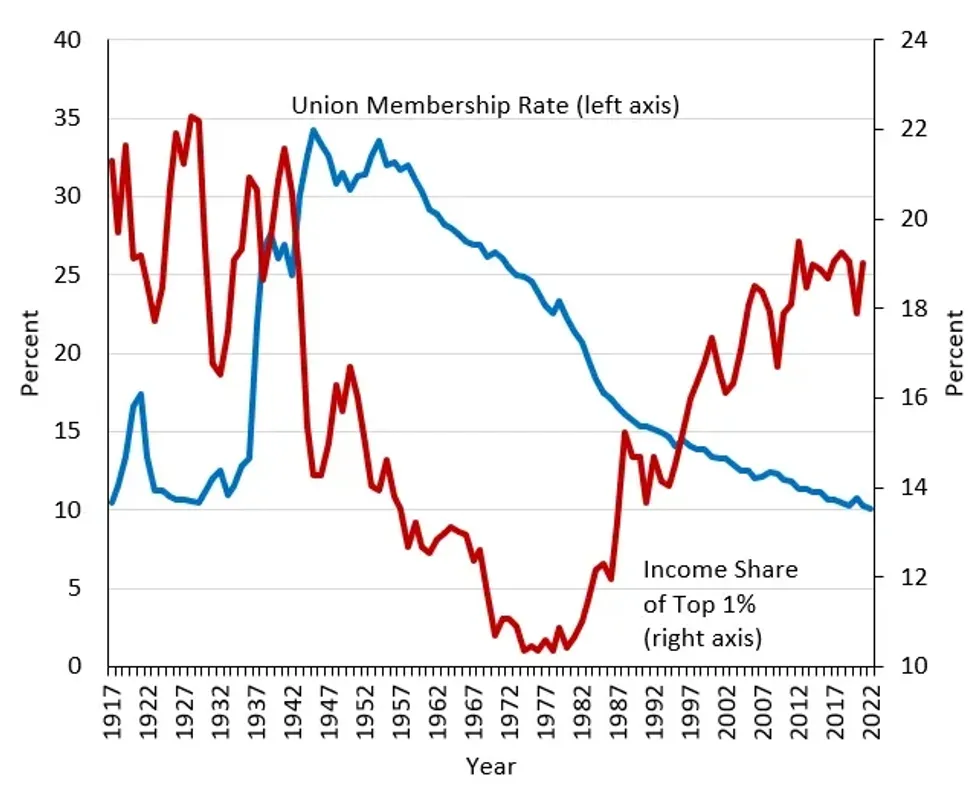(TEDGlobal 2014 transcript)
Why privacy matters
Glenn Greenwald was one of the first reporters to see — and write about — the Edward Snowden files, with their revelations about the United States' extensive surveillance of private citizens. In…
Awareness | Debate | Action
Elevate your social consciousness and become the problem that forces change

As a Texan living in the shadow of a liquefied natural gas facility, I was relieved to see the House move forward with a slate of foreign aid bills last week that do not include a rider reversing President Joe Biden’s LNG pause. It’s reason enough to celebrate Biden’s rejection of the rider provision and the Democrats’ united stand against Big Oil’s puppets in Congress.
The pause—which aims to halt the construction of toxic LNG export facilities until it can be determined whether or not they serve the public interest—is a bold attempt to end the profits over people ethos that has defined U.S. energy policy for too long. Citizens like me are grateful that some of our elected leaders are finally standing up to Big Oil. It’s clear the Big Oil gravy train doesn’t make stops for ordinary Americans—just cronies who will stop at nothing to do the bidding of the fossil fuel industry.
Speaker Mike Johnson (R-La.) signaled openness in recent weeks to linking the passage of the foreign aid package to a reversal of President Biden’s LNG pause—which would have been a massive handout to fossil fuel billionaires, who have padded their margins by exporting LNG to China.
Standing by its LNG pause, the Biden administration makes communities like Port Arthur feel heard.
Two weeks ago, Reps. Cathy McMorris Rodgers (R-Wash.) and Jeff Duncan (R-S.C.) led a field hearing in my hometown of Port Arthur, Texas—ground zero for Phase 2 of the Port Arthur LNG project—where they called for more LNG exports and accused President Biden of pandering to environmental extremists in an election year. But consider who the real extremists are in this fight: The communities begging for a chance to breathe clean air or three politicians who have received more than $2 million in oil and gas contributions?
Regardless of what Speaker Johnson would have you believe, the U.S. is surpassing its energy commitments to Europe, and U.S. LNG exports are already meeting Europe’s LNG needs. And European leaders know this, having affirmed the Biden administration’s leadership on the gas exports pause and recognizing that their security depends on clean energy investments.
What Speaker Johnson and other Big Oil insiders are hiding is that approving pending LNG export terminals would increase gas costs for industry, businesses, and households by $11-$18 billion in the near term and could increase gas prices for Americans by 9-14% each year—a fact backed up by a recent analysis from Energy Innovation.
Standing by its LNG pause, the Biden administration makes communities like Port Arthur feel heard. For years, our hometown endured cancer diagnoses and contaminated air—all while being told that LNG was a “win” for the local economy. Had they done their research on Port Arthur—which has had three operating refineries and other petrochemical facilities for many years—they would’ve known that our city has a poverty rate of 28%, an unemployment rate that’s almost three times the national average at 10.4%, and some of the lowest home values in Texas. If LNG facilities are meant to benefit ordinary citizens, shouldn’t the citizens of Port Arthur feel it by now?
And it’s not just Port Arthur that’s bearing the brunt of Big Oil’s reckless profit-seeking. Domestic consumers will face $14.3 billion in higher annual energy costs based on LNG facilities’ current rate of production. That doesn’t include the anticipated spike in prices that LNG proliferation will cause. Do you think those new plants will be built in Speaker Johnson’s community? Or will the Big Oil gravy train continue to steamroll over vulnerable working class neighborhoods like mine?
Biden and House Democrats’ defense of the LNG pause has certainly slowed the gravy train, but it hasn’t come to a stop. Doing that will require Democrats and climate-minded Republicans to remain united in the face of Big Oil’s antics. The fight isn’t over, but for the first time in a while, I can hear the voice of community leaders and courageous politicians over the sound of that unrelenting train whistle.

The UAW’s successful unionization effort last week at a Volkswagen plant in Chattanooga, Tennessee—the first successful unionization effort at a car factory in the South since the 1940s—is breaking the brains of Republicans in that region. They’re truly astonished that workers might not trust their corporate overlords with their working conditions, pay, health, and retirement.
Tennessee’s Republican Governor Bill Lee—along with Governors Kay Ivey (Alabama), Brian Kemp (Georgia), Tate Reeves (Mississippi), Henry McMaster (South Carolina), and Greg Abbott (Texas)—issued a joint statement last Tuesday condemning the vote:
We the Governors of Alabama, Georgia, Mississippi, South Carolina, Tennessee, and Texas are highly concerned about the unionization campaign driven by misinformation and scare tactics that the UAW has brought into our states…
In America, we respect our workforce and we do not need to pay a third party to tell us who can pick up a box or flip a switch. No one wants to hear this, but it’s the ugly reality… The experience in our states is when employees have a direct relationship with their employers, that makes for a more positive working environment. They can advocate for themselves and what is important to them without outside influence…
[W]e have serious reservations that the UAW leadership can represent our values. They proudly call themselves democratic socialists and seem more focused on helping President Biden get reelected than on the autoworker jobs being cut at plants they already represent.
Southern autoworkers, though, aren’t listening to the GOP’s BS any more: A unionization vote is set for the week of May 13 at a Mercedes plant in Alabama, and more than half the workers there have already signed a card indicating their desire for union representation.
The problem for Republicans is that unions represent a form of democracy in the workplace, and the GOP hates democracy as a matter of principle. It’s why conservatives have opposed every effort to expand voting rights from the Jim Crow era, through fighting woman’s suffrage, to opposing voting rights legislation from 1965 to this day.
Corporations, on the other hand, are not democracies: They’re organized along the lines of feudal-era kingdoms with a big boss (CEO), a small society of Lords and Ladies (senior executives and the board of directors), and a large number of serfs whose continued employment is up to the whims of the Boss and the Lords and Ladies.
Their commitment to gutting voting rolls and restricting voting rights, their obsession with women’s reproductive abilities, and their hatred of regulations and democracy in the workplace are increasingly seen by average American voters as out-of-touch and out-of-date.
In kingdoms and the form of government Republicans try to impose on Americans (particularly in Red states), power flows from the top-down; in democracies and unions, however, power flows from the bottom-up, with leaders, to quote the Declaration of Independence, exclusively “deriving their just powers from the consent of the governed.”
An interesting irony about the successful unionization of the Chattanooga Volkswagen plant is that that factory was the only Volkswagen operation in the world that wasn’t already unionized.
Representatives of the German-based corporation and its German union both traveled to Chattanooga to support workers voting for the union: In Germany, federal law requires every corporation with over 2,000 workers to have 50% of their board of directors drawn from their company’s unionized rank-and-file workers.
You could argue that we wouldn’t even have American democracy if it weren’t for unions; that we never would have had the Renaissance and the subsequent Enlightenment without them.
When the bubonic plague ravaged Europe in the middle of the 14th century, it killed so many workers, tightening the labor market, that the few who survived were able to demand higher wages.
Those who were skilled workers, from the construction trades to the arts to the professions, formed the first genuinely powerful guilds to negotiate on their behalf with employers and to enforce the contracts they’d worked out. This was also the beginning of the Freemasons, the “secret society” in which George Washington proudly claimed membership, that exists to this day and was the precursor to our modern unions.
The guilds and subsequent unions, through the Renaissance and the later Enlightenment, largely created the movements for universal suffrage and public education that led to the formation of the first middle classes and ultimately to our modern systems of democracy.
Modern American corporations have never been more profitable and their CEOs have never taken more out of our economy than in the past few decades, partly because of technology that improves productivity and partly because our pathetic percentage of unionization means CEOs, shareholders, and senior executives are free to pillage their companies while ignoring the very workers whose efforts made them rich.
According to Goldman Sachs, American corporations will spend over a trillion dollars this year on stock buybacks alone, all money that could instead have better compensated workers and thus strengthened our working class. Historically, as union density goes up inequality goes down and vice-versa. In the years since former President Ronald Reagan and the GOP declared war on unions in 1981, the wealth of the morbidly rich has exploded while worker salaries have largely stagnated.

Union members overall earn a bit over 10% more than their nonunion peers. For Black workers the numbers are even more stark: Black union workers earn 13.1% more than nonunion workers and for Hispanic workers it’s 18.1% more.
Women workers without a union earn only 78% of what men do; unionized women workers take home fully 94% of what men earn.
The “Great Compression” is what economists call the era from FDR’s presidency through the beginning of the Reagan Revolution: It was the only time in the history of America when inequality actually declined and workers’ pay increased at a faster rate than did their employers. High rates of unionization and a top marginal tax rate of 91-74% drove the process, but, since Reagan destroyed both, inequality has exploded.
Researchers found that for every 1% increase in unionized workers’ wages, there’s a corresponding 0.3% increase in the wages of nonunion workers because the unionized workplaces have established the local wage floor.
That inequality causes the U.S. economy to stagnate, as the morbidly rich save or invest their money in financial instruments rather than spending it or building new factories and businesses. We saw this played out as low GDP growth rates during the period from Reagan’s presidency through 2021, when Joe Biden brought us back to 1960’s-level economic growth by rejecting neoliberalism and embracing unions and Keynesian stimulus.
When worker wage increases are held low, average people have less disposable income and that slows the economy (something called “secular stagnation”); when their pay is enhanced by union representation, the economy surges (as we’re seeing right now).
The benefits of unionization aren’t limited to the unionized workers themselves. Nonunion companies, particularly smaller employers, find themselves having to compete for workers in a unionized high-wage environment that helps all workers.
Researchers found that for every 1% increase in unionized workers’ wages, there’s a corresponding 0.3% increase in the wages of nonunion workers because the unionized workplaces have established the local wage floor. This makes entire communities more prosperous.
Republicans appear committed to politically dying on a number of hills that time has passed by. Their commitment to gutting voting rolls and restricting voting rights, their obsession with women’s reproductive abilities, and their hatred of regulations and democracy in the workplace are increasingly seen by average American voters as out-of-touch and out-of-date. Elitist. Arrogant.
So they write increasingly frustrated rage-rants about “democratic socialists” and the evils of “union bosses” while the people in their states are choosing unions, reproductive freedom, and a clean environment.
Will they ever wake up and change their policies to ones supported by the majority of Americans?
As long as six corrupt Republicans on the Supreme Court continue to keep bribery legal and morbidly rich CEOs continue to hate unions almost as much as they dislike their own workers, I’m not holding my breath… and you shouldn’t, either.

The three-member trade panel hearing the U.S. complaint over Mexico’s restrictions on the use of genetically modified corn in tortillas will no doubt need some scientific advice to evaluate the technical evidence presented by the Mexican government on the risks associated with GM corn and their accompanying herbicide residues. They got some on April 23 from a panel of experts assembled by the Institute for Agriculture and Trade Policy (IATP) in the first of three webinars on the GM corn dispute.
Their message could not have been clearer. The Mexican government is right to doubt U.S. assurances that GM corn is safe to eat given the lax regulatory processes for GM crops in the U.S. There is a mountain of evidence that both GM corn and its accompanying herbicides, including glyphosate, may cause serious health problems. And those risks are magnified for Mexicans, who eat more than ten times the corn we eat in the U.S. and do so in minimally processed form, not processed foods.
"Has the U.S. government provided sufficient evidence to the Mexican government to assure the safety of GM corn, which is routinely sprayed with multiple herbicides known to be associated with reproductive problems, metabolic syndrome, and cancer?” asked pesticide expert Dr. Charles Benbrook in his remarks during the webinar. “No, because the studies have never been done."
Benbrook and his fellow panelists all were invited to submit formal comments to the trade panel hearing the dispute, a year-long process expected to be resolved by the end of the year. The eight submissions from U.S. and Mexican non-governmental organizations were published by the tribunal earlier this month. They offer a range of evidence that supports Mexico’s presidential decree, issued in February 2023, phasing out glyphosate use in Mexico and restricting the use of GM corn in tortillas and other minimally processed corn products. (The submitted comments are available in English and Spanish on this IATP resource page.)
Dr. Benbrook co-authored technical comments for Friends of the Earth, which focused on the rising toxicity of GM corn, particularly the insecticidal Bt varieties, and the failure of U.S. regulators to test them for safety.
“Mexico is correct to state that it cannot rely on the U.S. government to ensure the safety of GM crops.”
"The first GM corn varieties in the late 1990s expressed 2 ppm to 6 ppm of one or two Bt toxins in corn kernels, the part of the plant people eat,” said Dr. Benbrook. “Today's leading GM corn varieties express four to seven toxins in corn kernels and at much higher levels, 50 ppm to 100 ppm. Why the big increase? Because target insects become more tolerant to Bt toxins over time, and eventually fully resistant. This forces the seed-biotech industry to add in new GM toxins and engineer the plants to express them at much higher levels. That might help kill more insects for a short time, but it also steadily increases human food safety risks."
Bill Freese, Science Director at the U.S.-based Center for Food Safety, emphasized just how weak U.S. regulations are, allowing companies to introduce new products with no required safety testing. He referred to is as a “deregulatory regime” rather than proper regulation.
“U.S. regulation of GM crops does not even comply with the U.S.-Mexico-Canada trade agreement (USMCA) because it is weak and voluntary, not mandatory,” he said, claiming U.S. agencies have facilitated the rising toxicity in fields of GM crops. As Freese explained, “The Environmental Protection Agency has raised the permissible level of glyphosate on corn by 50-fold since the mid-1990s to facilitate introduction of GM corn, which is sprayed directly with glyphosate.”
Monsanto and new parent company Bayer are now paying out billions of dollars in damages to people who have suffered cancer and other ailments from glyphosate exposure.
Lucy Sharratt, coordinator of the Canadian Biotechnology Action Network (CBAN), highlighted Mexico’s strong rationale for its precautionary measures. CBAN was invited to offer comments to the trade panel but was later disinvited because it is a Canadian, not a U.S. or Mexican, organization. CBAN published its technical comments anyway.
"U.S. and Canadian government safety assessments of GM corn do not necessarily transfer readily to an assessment of safety in the Mexican context,” Sharratt explained to the webinar’s large online audience. “The U.S. and Canada argue that there is a long history of safe use of GM corn, but this is not the case in Mexico. The use of white corn in Mexico is entirely different from the history of the use of GM corn in processed food ingredients across North America. Mexico is largely self-sufficient in white corn, which is a staple of the diet, and has been mostly non-GM. Additionally, there is no post-market monitoring to validate safety of any use."
Mexican lawyer Javier Zuñiga, from the NGO Poder del Consumidor (Consumer Power), closed the expert panel, explaining that Mexico’s decree is both justified and legal under existing trade rules. “The Mexican government is obligated by its own constitution to take precautionary and preventive action to ensure the right to health, food, and a clean environment,” Zuñiga said. “Mexico's presidential decree is legal in the Mexican context and also under the USMCA, which includes exceptions for matters of public health.”
This scientific panel urged the trade tribunal to consider the evidence, listen to experts who do not have industry ties or conflicts of interest, and acknowledge that Mexico has the right to take precautionary measures to protect public health and the environment. It has done so in the least trade-distorting manner possible entirely consistent with USMCA guidelines.
As Freese concluded, “Mexico is correct to state that it cannot rely on the U.S. government to ensure the safety of GM crops.”
Two more webinars on other aspects of the trade dispute are scheduled May 2, on biodiversity and cultural rights, and May 7, with farmers’ perspectives on non-GM corn opportunities. The recording of this panel will be available April 25 here
 Former President Donald Trump said he wants young voters to know that "Crooked Joe Biden is responsible for banning TikTok." But a TikTok ban enjoys broad bipartisan support in Congress. Trump himself tried to ban TikTok as president through an executive order, but it was blocked by the courts.
Former President Donald Trump said he wants young voters to know that "Crooked Joe Biden is responsible for banning TikTok." But a TikTok ban enjoys broad bipartisan support in Congress. Trump himself tried to ban TikTok as president through an executive order, but it was blocked by the courts.
The post Trump’s Partisan Spin on TikTok appeared first on FactCheck.org.
 While the risks associated with COVID-19 generally have decreased over time due to prior exposure to the vaccines and the virus, some people remain at elevated risk, such as the elderly and immunocompromised. The updated COVID-19 vaccines and, in some cases, a new monoclonal antibody can provide increased protection for this group.
While the risks associated with COVID-19 generally have decreased over time due to prior exposure to the vaccines and the virus, some people remain at elevated risk, such as the elderly and immunocompromised. The updated COVID-19 vaccines and, in some cases, a new monoclonal antibody can provide increased protection for this group.
The post Q&A on Reducing COVID-19 Risk for Elderly, Immunocompromised appeared first on FactCheck.org.
A Democratic PAC focused on restoring a Democratic majority in the House.
The post House Majority PAC appeared first on FactCheck.org.
Are you interested in how you impact the rest of the world, or how others impact the world thereby affecting you? Do you want to do something to improve things? ... About Us
Objective journalism on the struggles of democracy in a socially stratified society.
Added by Cromag 0 Comments 0 Likes
Added by Cromag 0 Comments 0 Likes
Added by Cromag 0 Comments 0 Likes
For people with COPD, Multiple Chemical Sensitivity, and Asthma, Chemically Scented Products can be a major Disability Barrier. Just a quick surf on the internet shows how many people are unable to…Continue
Started by Melva Smith in Sample Title Aug 9, 2011.
Dear Fellow Activists. What do you all think about a scent-free Olympics? If you or someone you know finds scented products to be a disability barrier, you might be interested in knowing that there…Continue
Tags: COPD, Sensitivity, Allergy, Sports, barriers
Started by Melva Smith in Sample Title Jun 21, 2011.
I've been active now in a concerted way for many years, and I've worked on a number of causes and with many different people. Most of these relationships have been very positive. Activists are…Continue
Tags: organizing, activism, Ethics
Started by Cromag in Uncategorized. Last reply by Ice Goldberg Oct 21, 2009.
Posted by Cromag on December 22, 2016 at 9:08pm 0 Comments 0 Likes
A new movement is working to protect our environment through the recognition of its fundamental rights. It’s an idea whose time has come.
By Mari Margil from December 20, 2016, 4:39 pm – 8 MIN READ… ContinuePosted by Cromag on December 4, 2016 at 1:00pm 0 Comments 0 Likes
 The plastic and paper bag law is ostensibly environmental legislation in hopes that a small fee will diminish the environmental impact of single-use merchant bags. It was possible to have the fee go into an environmental fund to help with diminishing the impact, but that was voted down by CA Prop 65. The resulting declining of Prop 65 is essentially saying that we cannot force the…
The plastic and paper bag law is ostensibly environmental legislation in hopes that a small fee will diminish the environmental impact of single-use merchant bags. It was possible to have the fee go into an environmental fund to help with diminishing the impact, but that was voted down by CA Prop 65. The resulting declining of Prop 65 is essentially saying that we cannot force the…
Posted by Cromag on May 22, 2016 at 9:55am 0 Comments 0 Likes
via Independent Science News | by Jonathan Latham, PhD
 Piecemeal, and at long last, chemical manufacturers have begun removing the endocrine-disrupting plastic…
Piecemeal, and at long last, chemical manufacturers have begun removing the endocrine-disrupting plastic…
Posted by Cromag on March 15, 2015 at 12:30pm 0 Comments 0 Likes
Just because food is labeled organic doesn't mean it's what you're expecting, journalist Peter Laufer tells Salon
Published Saturday, Jul 19, 2014 11:00 AM PST…
ContinuePosted by Cromag on October 23, 2014 at 2:51pm 0 Comments 0 Likes
... "So what would a radically different law-driven consciousness look like?” The question was posed over three decades ago by a University of Southern California law professor as his lecture drew to a close. “One in which Nature had rights,” he continued. “Yes, rivers, lakes, trees. . . . How could such a posture in law affect a community’s view of…
Posted by Cromag on October 15, 2014 at 12:30pm 0 Comments 0 Likes
(TEDGlobal 2014 transcript)
Why privacy matters
Glenn Greenwald was one of the first reporters to see — and write about — the Edward Snowden files, with their revelations about the United States' extensive surveillance of private citizens. In…
Posted by Cromag on March 4, 2014 at 1:00pm 0 Comments 0 Likes
By Chris Hedges March 2nd, 2014
OXFORD, England—The morning after my Feb. 20 debate at the Oxford Union, I walked from my hotel along Oxford’s narrow cobblestone streets, past its storied colleges with resplendent lawns and…
ContinuePosted by Cromag on February 28, 2014 at 3:24pm 0 Comments 0 Likes
We live in an interdependent world, where nations are increasingly…
Posted by Cromag on February 22, 2014 at 6:00pm 0 Comments 0 Likes
Reactions to Anatomy of a Deep State from the Bill Moyers Show
February 2014 - Credit: Dale Robbins
The notion of the “Deep State” as outlined by…
ContinuePosted by Cromag on January 27, 2014 at 8:00am 0 Comments 0 Likes
A specter is haunting the French humanist mind these days--a radical ecology movement that threatens to replace the idealization of humanity with an idealization of nature. Already we see "the passing of the humanist era," writes Luc Ferry, a philosopher at the Sorbonne and the University of Caen, in this prize-winning critique of that movement, a book all environmentalists ought to read. It…
1 member
1 member
2 members
|

© 2024 Created by Cromag.
Powered by
![]()